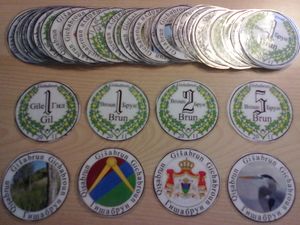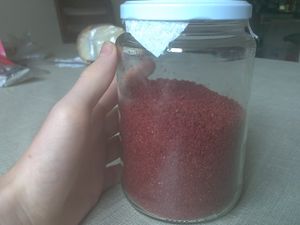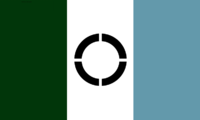KleinZav
This article refers to a micronation or element of micronationalism which is defunct and no longer exists. You can help make the article reflect that or ask on the talk page for further information. |
 | |
| State-owned corporation | |
| Industry | Horticulture |
| Predecessor | Compass Industries |
| Founded | 30 March 2011 (as Compass Industries) |
| Defunct | 17 March 2015 |
| Headquarters | , |
Area served | Gishabrun SAR |
| Products | Sumac powder, currency |
| Owner | Kuri Kabanov |
| Parent | Multiplex Technical |
The KleinZav Corporation, also known informally as KleinZav, was the state corporation of Gishabrun SAR. As a state capitalist jurisdiction, Gishabrun's government was identical to that of the Board of Directors of KleinZav, and KlenZav had a complete monopoly in Gishabrun. It was most notable for its production and sale of sumac powder.
Etymology
"KleinZav" is a portmanteau of "Klein" (for Felix Klein, the famous German mathematician) and "Zavod" (Russian for "factory"), and so was essentially a factory named in the honour of Felix Klein. "Klein" also means "small" in German, which could be a reference to the micronational affiliation of this corporation. KleinZav also had an unofficial long name in the Soviet style, the "Gishabruni Experimental-Industrial Factory named after Felix Klein" (Russian: "Гишабрунский опытно-промышленный завод имени Ф. С. Клейна").
The predecessor to KleinZav, Compass Industries, took its name as a reference to Gishabrun's national symbol, the compass.
History

The company was created on 30 March 2011 as the state company of the Tsarist Empire of Gishabrun, Gishabrun SAR's predecessor, under the name Compass Industries. It was created by the second amendment to the Tsarist Empire's constitution, as part of its new pentacameral legislature. The assembly of all employees of Compass Industries, the so-called Leagues Chamber, was one of the four lower houses of the Council of Gishabrun (the imperial legislature), and the Chief Executive of Compass Industries, under the name "Head of Business", was one of the five members of the Elite Duma, the Council's upper house. The Head of Business was chosen by an election in the Leagues Chamber every six months. According to the constitution, the Leagues Chamber had "power over the Economy, Taxation, Currency, and the Bank" (Gishabruni Tsarist Constitution, 2nd Amendment, Section 5 Article 3).
As the Tsarist Empire of Gishabrun's state company, Compass Industries was responsible for a variety of economic topics in theory, but in practice it only ever used its powers to print currency and make the budget. Compass Industries, via its subsidiary the Bank of Gishabrun, printed the Tsarist Empire's currency, the Brun, as well as the currency of the Technological Federation of Erephisia, the Erephisian Graaff. It also sold samples of both of these currencies to collectors worldwide.
The situation described above persisted until the Tsarist Empire's dissolution on 22 July 2012. After that point, Compass Industries was renamed KleinZav and was de facto a private corporation until the adoption of the new Gishabrun SAR constitution on 22 July 2013, when it became identical with the government of Gishabrun and adopted its current form.
On 11 August 2014, the Multiplexing Act (2014) was passed by the Renasian Guntanu'tl, and KleinZav became a subsidiary of the state-owned Multiplex Technical. KleinZav was finally dissolved with the dissolution of Gishabrun SAR's government on March 17th, 2015, which left Gishabrun an absolute monarchy under Knyaz Kuri.
Organisation
KleinZav was run by a five-member Board of Directors, consisting of the Director of Gishabruni Affairs, the Director of Research and Industry, Director of Economic Profitability, Director of Foreign Business, and the Knyaz of Gishabrun. The Knyaz was ex officio the Chief Executive Officer of KleinZav and appointed the other directors.
Production

KleinZav's main product was sumac powder, a sour spice widely used in Middle Eastern cuisine, which KleinZav produced in large quantities from sumac gathered on Canadian territory. Planned projects included an aluminum foundry similar to that of RenTech's 2012 F-Alpha project, in cooperation with other subsidiaries of Multiplex Technical. There was also an attempt to grow oyster mushrooms in Kravat Oblast in 2013, which failed due a contamination of the substrate. KleinZav also produced Kefir in Kravat Oblast for local consumption.
KleinZav owned the majority of Renasia's precious metals in the form of silver, which was used as the basis for the value of the Pecune.
